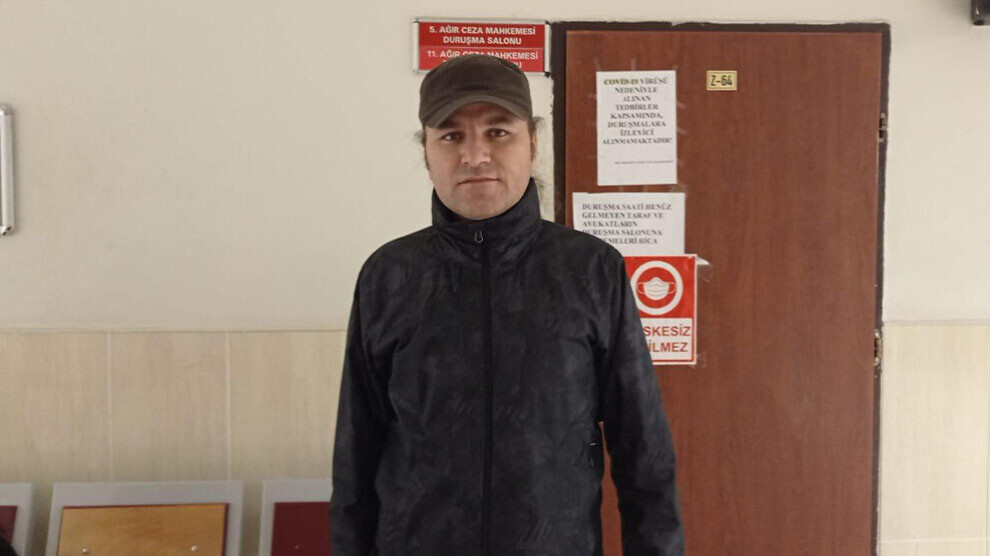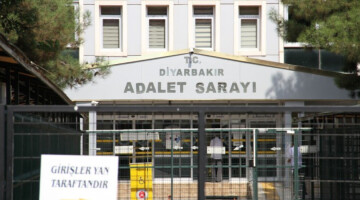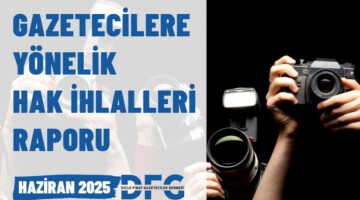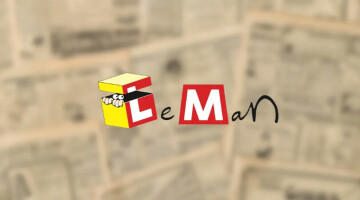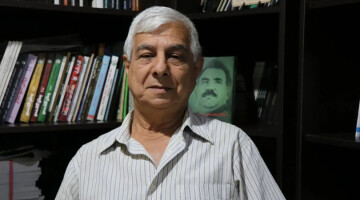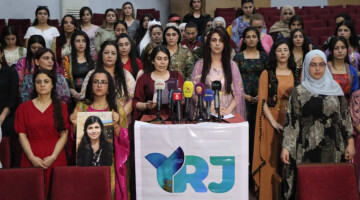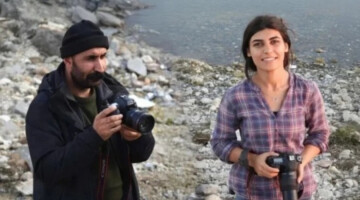Kurdish journalist Abdurrahman Gök has been on trial in Amed this week. If the General Prosecutor's Office in Diyarbakır has it his way, the 40-year-old could be sentenced on charges of violating anti-terrorism legislation. The prosecution is calling for a sentence of between seven and twenty years in prison. The photo reporter, who works as a correspondent for the Mezopotamya (MA) news agency, is accused of membership in an armed organization and terrorist propaganda. Allegedly, Gök is a member of the "press committee" of the Kurdistan Society (KCK), an umbrella organization formed on the initiative of the imprisoned PKK founder Abdullah Öcalan, to which the Kurdistan Workers' Party also belongs. Gök rejects the allegations against him as "absurd". “Journalism is on trial here,” he commented on the process.
The charges against Gök go back to a preliminary investigation from October 2018. The chief public prosecutor in the Kurdish resistance stronghold had searched around 200 objects belonging to Kurdish organizations, media institutions and party buildings and had 141 people arrested. Arrest warrants were later issued against 25 people on vaguely worded terrorist charges. Gök was also taken into custody at the time, but was released four days later. However, the court imposed a ban on going abroad.
The indictment took two years to complete
It took a good two years for the indictment against Gök to be drafted. The opening decision for the procedure that to be heard at the 5th court has been available since last October. The allegations against the journalist are based on statements by a so-called “anonymous witness” (possible taken from the state-compiled list of witnesses who are used in all trials against unpleasant opposition members and media workers) as well as on his critical reporting, posts and content from telephone conversations. Abdurrahman Gök is also internationally known for his journalistic work, as it was only thanks to him that the public learned that the death of the young art student Kemal Kurkut, who was shot by a police officer in March 2017 during Newroz celebrations in Amed, was in fact premeditated murder. Gök had pressed the shutter release of his camera eight times and documented that the official version, according to which Kurkut was a "suicide bomber", was a police fabrication to cover the more brutal truth.
Many colleagues gathered on Tuesday to the court to express their solidarity with the journalist, including the spokeswoman for the Mesopotamian journalists 'platform Ayşe Güney, the co-chair of the journalists' association Dicle-Firat (DFG) Dicle Müftüoğlu, and MA editor Kadri Esen. Only four people were admitted as observers at the trial, including a representative of the journalists' union TGS.
Allegations: Photos from Kobanê and Shengal
Among other things, Gök is accused of writing an article about the plundering of Kurdish musical culture under the guise of fighting terrorism. The journalist exposed a case of plagiarism allegation involving right-wing extremist Turkish singer Mustafa Yıldızdoğan, who allegedly stole the melody of the Kurdish national anthem “Ey Raqîp” to use it for his nationalist song “I die for you, my Turkey”.
In addition to a speech by Gök on the Day of Kurdish Journalism (April 22) and a number of Twitter posts, the indictment also included various minutes of illegally tapped phone calls, including the journalist's answer to a colleague's question about who is the current chairman of the Kurdish movement TEV-DEM in Rojava.
Photos of members of the People's and Women's Defense Units YPG / YPJ, who Gök shot during the liberation of Kobanê in 2014 - when both associations in Turkey had not yet been declared “terrorist organizations” - and those of armed units in Shengal who defended the Yazidi population attacked by the ISIS and who fled into the mountains, the attorney general believes they can also prove that the journalist is a member of the “KCK press committee”.
Biased trial
The fact that the process is clearly politically motivated and will be grossly unfair was also shown by the judge's question at the beginning of the hearing on Tuesday. He interrupted Gök's defense speech, in which he described the allegations of the key witness ‘Sabır’ (‘Patience’) as false, and asked: “Are you saying that your reports are not in accordance with Öcalan's opinions?”
Gök replied that in his 17-year career as a journalist in the crisis areas of Syria, Iraq and Iran, he had always worked according to the universal standards of good journalism. Nobody ever approached him because of partiality or an untrue factual assertion and nobody demanded rectification of a news from him. “It is true that in recent years I have often been investigated under terrorism allegations; the proceedings were always dropped and did not lead to convictions,” explained Gök.
Lawyers underlined
Lawyer Resul Tamur protested the minutes of the conversation and other details in the indictment, translated from Kurdish "incorrectly". The lawyer recalled how the public prosecutor's office denied its status as a newspaper to the first Kurdish-language newspaper "Kurdistan", published in Egypt in 1898, and labelled it a "so-called newspaper". This degradation is "impolite and hurtful", but runs like a red thread through the entire indictment, said the lawyer, adding: "This is clearly another case of journalism on the dock.” Lawyer Tamur, demanded his client’s acquittal. The court ordered the lifting of the ban to go abroad and allowed the defense 14 days to submit questions to the key witness. The next hearing will be on 3 June.

